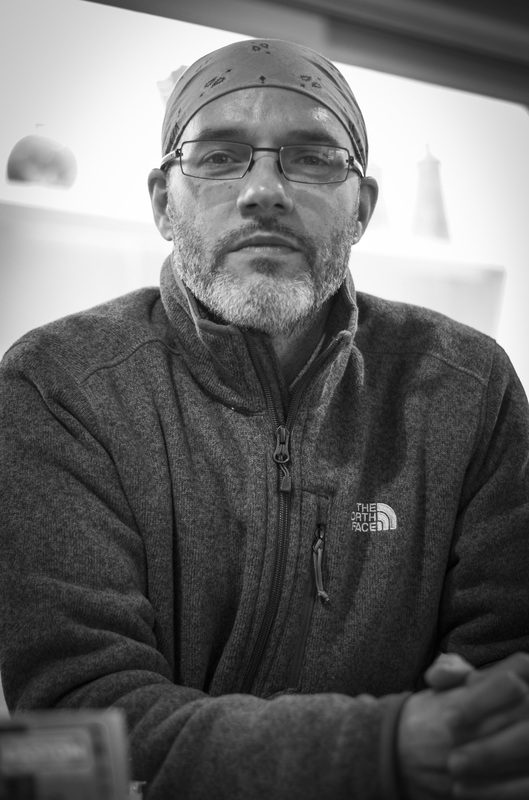 Anthony Marraccini is the manager and curator of Connexions Gallery and the publisher of The Elucidator magazine. He is a West Ward resident and believes an honest conversation about the area needs to begin with the inherent racial and socioeconomic inequity that he feels exists there and in our society in general. "Common misconceptions about the West Ward? I'm going to have to make that a subjective observation, obviously, based on my own perceptions: that it's a dystopic, violent place, which it's not. It's still a vibrant neighborhood with its own struggles, but it's not unfixable." "So what do you see as a solution for fixing it?" "Oh, solutions being what they are, that's just all reinvestment. How do you reinvest? That's subjective as well, what you consider reinvestment. Some people see gentrification as reinvestment, which it is--it's a much more abrupt, easier way to change a community, but that's more like economic cleansing, you know, like, 'We don't want poor people here,' and you push them away. You don't want crime; crime is associated with poverty in a lot of ways--you look at the statistics and you'll see it--so you push the poverty away--'Whoa! Hey! I fixed the problem, didn't I?!' Well, I don't know--fixed the problem? More like *moved* the problem. We're gonna, as a society in America, we're gonna have this problem for a very long time until we associate spreading the gains we have as a country. You can't keep taking all your money and putting it offshore in China when good jobs used to be here. You can't do that and think that people are going to live off of eight, ten dollars an hour. It's just not gonna happen." "Sounds like a pessimistic outlook…" "No, no. I would never say pessimistic. You have to take a *realist* point of view if you're going to try and fix something. Pessimism is saying, 'There's no way to fix it.' That's pessimism. I'm just taking a realistic point of view. I'm saying you can't do that unless you reinvest. If you think reinvesting is just pushing the problem away, well that's bullshit. So, you gotta find a way to reinvest. If I think that corporations are going to change their minds and start bringing jobs back here, because they think that Chinese labor is immoral, well, no, they're not gonna: it's based on dividends. What we have to do as consumers is change the way we consume, but also as business people, change the way we do business, so I'm pro-entrepreneur, I'm pro-market, but I think the market is skewed currently: 'Well, hey, if you have enough money you can change the market all you want. You could manipulate the market to benefit you. You could create tariffs that allow you to do slave labor half a world away that no one ever sees for a dollar a day under a despotic regime,' and that's what we do. But you can't keep doing that if we want people to be prosperous. *I* feel like there are lingering and latent issues about class and race we as a society have no desire to talk about in an honest fashion. So, that's another aspect of it: you look at poverty, it's primarily minority, undereducated people, and it'll always be that way until you associate that problem as part of your core issues. You know, I'm not a Christian, but I dig on what He said, 'We all raise each other.' It's not gonna happen if you see all as Others. So, yeah, there's a lot that has to be done to fix it, but I think it's fixable, but then you have to have these honest conversations. So back to what you were saying, 'Is that pessimistic?' No, we just have to have honest conversations. We say, well, why are there more blacks in jail? If drug use is the same amongst all racial demographics, why are there more blacks in jail? Nobody wants to answer that question. It's because they get caught. Well, why do they get caught? Well, I don't know. Think about that, because that's the truth, because there are disproportionately waaay more black people in jail. So once you get a rap, good luck getting a job, then you're stuck in the system and it becomes intergenerational and then it's just you're subsidizing poverty and we start pointing fingers like, 'That's the problem.' No, the problem is you made up rules that don't necessarily apply to everybody; they only apply to *that* demographic. So there's a lot there, a lot there."
0 Comments
Leave a Reply. |
These are the stories of the people of Easton, PA Archives
August 2018
|

 RSS Feed
RSS Feed
